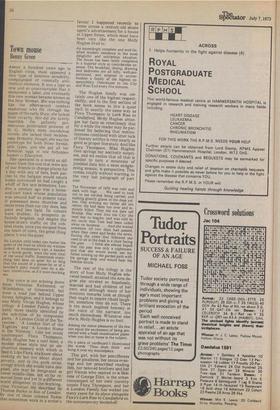Town mouse
Benny Green
About a hundred years ago in English cities, there appeared a new type of feminine sensibility, compounded of comically antithetical elements. It was a type so new and so unaccountable that it demanded a label, and eventually this new woman became known as the. New Woman. She was nothing like the effervescent cerebral madonnas who flit through the pages of the early Shaw; she lacked their vivacity. Nor did she faintly resemble the gallantly promiscuous petticoated pioneers of H. G. Wells's more scandalous novels; she lacked their recklessness. Probably, though, she was the prototype for both those formidable types, and she put all her Feminist eggs in one forbidden basket — Education.
She operated in a world so different from this one that were any of our friends to change places for a day with any of hers, both parties to the bargain would return home convinced he had caught a whiff of fire and brimstone. London a century ago was a horseand-cart town whose population was around half its present total. It possessed more churches and more trees than our city does, less pace and less light. Its colours were drabber, its prospects infinitely brighter, and despite the horse-drawn traffic on the cobbled roads, once you escaped from the heart of town, the great thing about it was the quiet:
No London child today can realise the quiet of the road on which my window looked. A tradesman's cart, a hawker or a hurdy-gurdy, were the sum total of the usual traffic. Sometimes everything had been so quiet for so long that the sound of a passer-by or of a butcher's pony would take on a distant, unreal tone, as if it were mocking roe.
The voice is not echoing down from Victorian Richmond, or Wimbledon, or Greenwich, but from a road just behind Upper Street, Islington, and it belongs to one Molly Vivian Hughes, whose trilogy A London Family is probably more readily identified by the sub-titles of its component parts, ' A London Child of the 'Seventies ', A London Girl of the 'Eighties' and 'A London Home in the 'Nineties '. Like her rustic counterpart Flora Thompson, Molly, Hughes has a cool head, a modest prose style and an elephantine memory with which to feed it. Like Flora, she knew about making do but not about abject poverty, and in the snob terminology which she would have despised, she may be designated as lower middle-class, not so far removed from and yet in a different world altogether to the workingclass Victorian life described by Thomas Burke in Son of London. By one of those colossal flukes that sometimes work in a writer's
favour I happened recently to come across a century-old estate agent's advertisement for a house in Upper Street, which must have been very like the one Molly Hughes lived in:
An exceedingly complete and well-finished modern residence in the most delightful and salubrious situation. The house has been lately completed in a superior style at considerable expense. The breakfast, dining, drawing and bedrooms are all lofty, well-proportioned, and adapted to accommodate a family of the highest respectability. Omnibuses to the City and West End every five minutes.
The Hughes family was certainly one of the highest respectability, and in the first section of the book seems to live a quiet idyll. In exactly the same way as Flora Thompson in Lark Rise to Candleford, Molly Hughes arranges her facts so relentlessly that for a while the reader may be pardoned for believing that meticulousness combined with utter lack of literary artifice is very nearly as good as proper literature. And like Flora Thompson, Miss Hughes then springs her aesthetic surprises, and we realise that all that is needed to turn a mountain of jumbled data into a most enlightening mosaic, is perspective. This comes, totally without warning, in the very last paragraph of part one:
The November of 1879 was cold and dark with fogs . . . We used to look out to see torches being carried, and making ghastly glares in the deep yellow. One evening my father did not return. He had been run over and instantly killed. They did not dare tell Mother. She went into the City the next day to inquire, and was told by my uncle that Tom had been called away on business . . And she waited somehow till two days had passed, when they came and broke the news During the years that followed she used to sit in the dusk in a chair facing the gate . . . I think she almost hoped that the past was only a nightmare, and that she would surely see my father coming up the garden path with his springy step, and would hear his familiar knock.
The rest of the trilogy is the story of haw Molly Hughes educated herself, attained the Arts degree she coveted so hopelessly,. married and had children of her own, and although many of her innocent remarks look as though they ought to inspire ribald laughter, somehow they do not. There is too much inspired honesty in the voice of the narrator, too much shrewdness. Whatever else she is, Molly Hughes is no fool:
Among the minor pleasures of life few can equal the excitement of being presented with a fresh examination paper,' when you feel at home in the subject.
On a piece of cardboard I illuminated the words ' Thou shalt think ' and hung it over my mantelpiece.
This girl, with her pencilboxes and her pinafores, her cocoa evenings and her prescribed reading lists, her beloved brothers and her girl friends who aspired to a likeness of George Eliot, is the urban counterpart of her own country cousin Flora Thompson, and her A London Family has waited too many years for its place alongside Flora's Lark Rise to Candleford on the contemporary bookshelf.












































 Previous page
Previous page